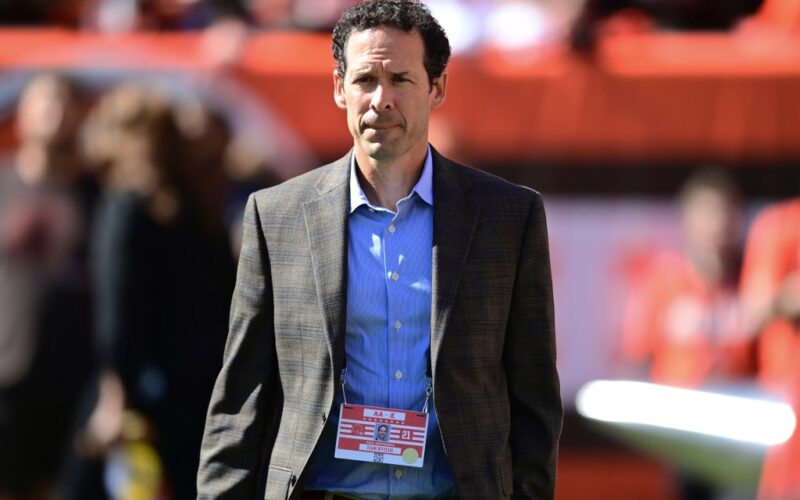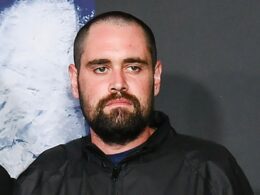LAS VEGAS — A few years ago, Paul DePodesta was having lunch with some of his Cleveland Browns colleagues when the conversation turned to baseball. The group was lamenting the state of the sport at the time. The games were too long and the strikeouts were too frequent. The group turned quiet for a moment, until someone broke the silence by saying, “Yeah, thanks, Paul.”
Even in football, DePodesta was being blamed for the demise of baseball.
DePodesta, of “Moneyball” fame, is back in baseball after a 10-year stint in the NFL with the Browns. The Colorado Rockies recently tapped him to head up their baseball operations department, his first job in baseball since he left the Mets in 2016. Given that his last stop in the sport was in Queens, he’s taking lessons learned from his time with the Mets and his years working with former general manager Sandy Alderson with him in his new role with the Rockies.
“I think we were able to sort of build it the right way there,” DePodesta said Tuesday at the MLB general manager meetings in Las Vegas. “I think I was really proud of what we were able to do over the course of those years, getting to the World Series, and they were still certainly competitive after that. There were some challenging moments in there, and some obstacles that we had to overcome during those years. But I think there was a lot that I’d like to be able to replicate.”
You might remember some of the prospects that came out of the Mets’ minor league system DePodesta oversaw: Jeurys Familia, Brandon Nimmo, Wilmer Flores, Travid d’Arnaud, and all of the vaunted “Five Aces,” Zack Wheeler, Matt Harvey, Jacob deGrom, Steven Matz and Noah Syndergaard.
Replicating any sort of success won’t come easy with the Rockies. They haven’t won more than 74 games since 2018, their owners don’t invest in the team, and the altitude makes it nearly impossible to lure free agent pitchers to Denver, placing the pitching onus on a farm system that isn’t highly regarded.
The game has changed since the last time DePodesta was in it, and it appears as though it’s passed the Rockies by completely. DePodesta will draw heavily on his player development background with the Mets to try to move the Rockies forward, though he acknowledges that development philosophies have changed drastically in the decade he was out of the game.
There are more people involved at every level of the game. More specialized roles, and more personalized coaching, something he learned from his teenage sons playing baseball. There is also more technology and more information than ever.
“There was a time in baseball that I remember well, where the idea of changing someone’s delivery or changing their pitch repertoire, I mean, that was sort of taboo,” he said. “Maybe you had a changeup, or something like that, but changing the shape of somebody’s breaking ball or giving them other pitches, or really changing their delivery? It was like, ‘Hey, this is the guy we scouted and drafted, and you don’t want to hurt him, or something like that by changing too much.’
“Nowadays, I think players almost expect it. It’s, ‘Hey, how are you going to optimize me in all those phases, with my pitch mix, with my delivery, etc?’ So I think that’s been, that’s been a sea of change in the game.”
DePodesta was once considered cold and calculating, with his critics saying he failed to see the human element of the game. He was accused of ruining the game. His fame overshadowed his efforts as the general manager of the Los Angeles Dodgers. He now admits he didn’t handle it well.
The thing about DePodesta is that his fame is always going to follow him. No other baseball executive has been played by Jonah Hill in a box office hit. Books have been written on other general managers, but few have had the reach of “Moneyball.”
“When I first took the job, what I was concerned about was that it would become about me,” he said. “I don’t think it should ever be about me. It shouldn’t be about the general manager, it should be about the team, right? I was very conscious during those years of trying to make it about the team and not trying to make it about me.
“But I did not do that effectively, like at all.”
By the time Alderson brought him to the Mets, his star had long since faded. Maybe he needed the anonymity afforded by a behind-the-scenes role in player development. The technology he once championed and the analytical data has now exploded in baseball.
“I think this was a wave that was inevitable,” he said. “Even without me, or without anything we did in Oakland, I think it was the advancement of technology: What was possible, what was possible to measure, what was possible in terms of gaining information to help you make a decision.”
The human element is still there, and so are the editorials about how analytics are slowly killing the game. Yet somehow the game has survived, and one of its most notable figures is back in it. At nearly 53, DePodesta is ready to revive the Rockies.








